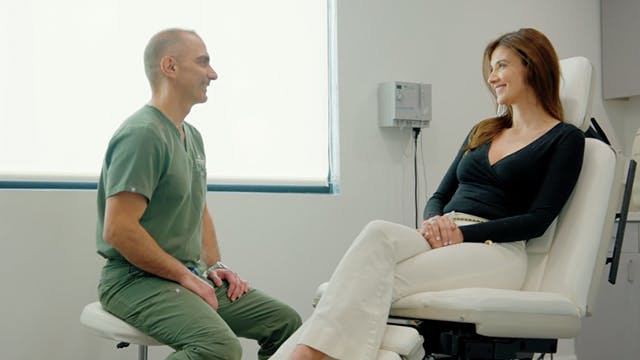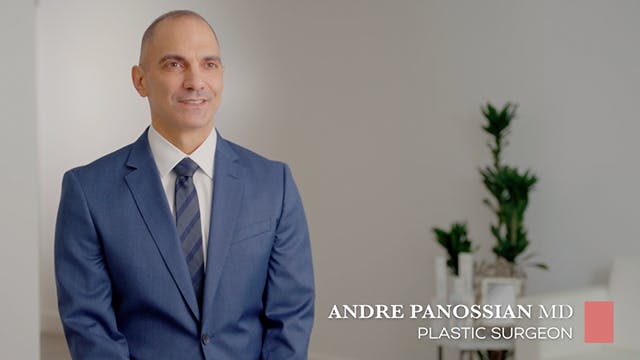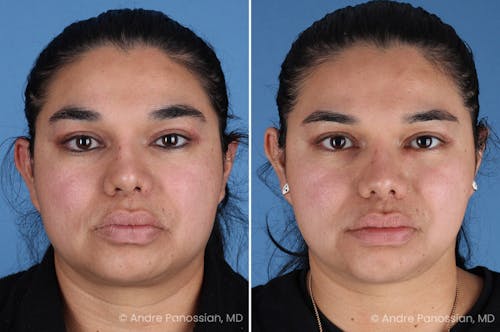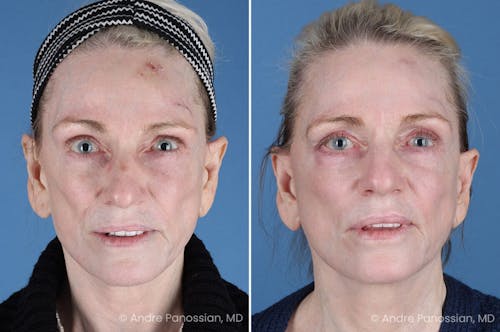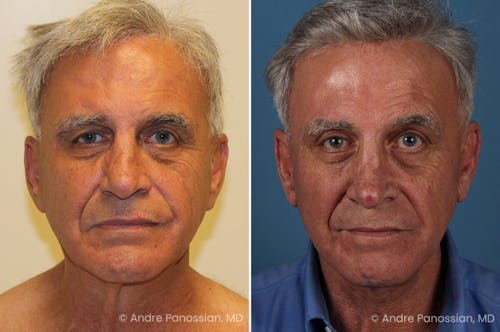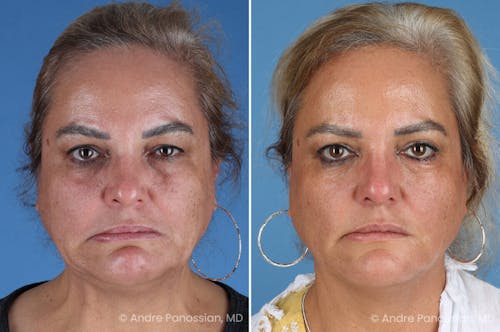Unlock natural facial movement and restore symmetry with our specialized selective neurolysis for synkinesis treatment, tailored to alleviate involuntary muscle movements and enhance your facial expression.
Selective Neurolysis For Synkinesis Pasadena & Glendale


Rediscover Your Identity with Dr. Panossian in Pasadena
Are you tired of feeling like your facial expressions are out of control? Synkinesis, a condition where involuntary muscle movements occur alongside intentional ones, can greatly impact your confidence and sense of self. Dr. Panossian, a renowned expert in facial paralysis and reconstruction, understands the emotional toll that synkinesis can take. With his specialized training, including a unique fellowship in facial paralysis under Dr. Ron Zuker, he offers selective neurolysis for synkinesis, a treatment to restore harmony to your facial movements. Dr. Panossian's collaboration with facial rehabilitation therapists ensures comprehensive care tailored to your needs, providing hope for those struggling with synkinesis to rediscover their identity and regain confidence in their appearance.
Understanding Synkinesis
Synkinesis refers to the involuntary movement of certain facial muscles that occurs simultaneously with the intentional movement of others. This condition typically arises following facial nerve injury or paralysis, such as Bell's palsy or trauma. When the facial nerve regenerates after injury, nerve fibers may become improperly connected, leading to misdirected signals to facial muscles. As a result, individuals may experience unintended movements, such as eye closure when smiling or lip movement when closing their eyes. Synkinesis can significantly impact facial expression and emotional well-being, as it may cause social discomfort and affect self-confidence. Understanding synkinesis is crucial for guiding treatment approaches to improve facial function and restore natural facial movements. While physical therapy and BOTOX® injections remain the primary treatment options for managing synkinesis, there are instances where these approaches may not fully alleviate the condition. In such cases, surgical intervention offers a potential solution by targeting the divergent neural pathways responsible for synkinesis.

Synkinesis Treatments
Synkinesis, often arising from facial paralysis or Bell's palsy, can lead to involuntary muscle movements that can significantly impact facial symmetry and function. Dr. Panossian offers a range of advanced treatments tailored to address these symptoms and restore optimal facial control and appearance. Through meticulous surgical techniques and innovative approaches, our synkinesis treatments aim to alleviate muscle contractions and enhance facial symmetry, ultimately empowering patients to regain confidence in their facial expressions and quality of life.
Selective Myectomy
In addition to neurolysis, selective myectomy, or targeted muscle release, serves as an adjunctive procedure to alleviate unwanted muscle twitching or contractions. This method involves identifying hyperactive muscles before surgery, often preceded by initial treatment with BOTOX injections to target specific muscle groups. For instance, the lower lip depressors and the platysma, a broad muscle extending from the jawline into the neck, can be strategically weakened to reduce their downward force on the lower lip. Similarly, accessory muscles responsible for nasal twitching can be surgically weakened to mitigate troublesome contractions.
Selective Neurectomy
Selective neurectomy is another surgical procedure commonly used to address synkinesis, characterized by involuntary muscle movements that occur simultaneously with intentional movements of other muscles. During selective neurectomy, specific nerves that trigger synkinetic movements are identified and surgically severed to reduce or eliminate unwanted muscle contractions. This specialized surgical approach aims to improve facial control and symmetry for individuals affected by synkinesis, offering the potential for enhanced facial function and appearance.
Selective Neurolysis
Selective neurolysis for synkinesis is a surgical procedure that addresses the involuntary muscle movements associated with synkinesis, often occurring in patients recovering from facial paralysis or Bell's palsy. The procedure begins with initial treatments such as selective BOTOX injections to better understand the aberrant neural pathways involved. Subsequently, targeted nerve destruction, or neurolysis, is performed with precision. Neurolysis involves identifying and treating specific facial nerve branches, utilizing nerve monitors to locate and verify tiny nerve branches before their division. Dr. Panossian aims to reduce synkinetic symptoms and improve facial symmetry and function by interrupting the aberrant neural pathways responsible for synkinetic movements. Additionally, selective neurectomy, involving the surgical removal of specific nerve branches, may be performed in conjunction with neurolysis to enhance treatment outcomes further. This comprehensive approach ensures more precise and effective management of synkinesis symptoms, ultimately helping patients regain better control over their facial movements and improve their quality of life.
The Benefits of Synkinesis Treatment
Living with synkinesis can be emotionally challenging, as involuntary facial muscle movements can impact your confidence and self-image. Serving patients from Pasadena, Glendale, and beyond, Dr. Panossian understands the frustration and discomfort associated with this condition and offers specialized treatments to address synkinesis symptoms. Through procedures like selective neurolysis and neurectomy in Pasadena & Glendale, Dr. Panossian provides tailored solutions to alleviate your concerns and restore natural facial movement. Discover the transformative benefits of synkinesis treatment now:
- Improved Facial Symmetry: Synkinesis treatment can help restore facial symmetry by reducing involuntary muscle movements and restoring balance to facial expressions.
- Enhanced Facial Control: Treatment can improve voluntary control over facial movements by targeting specific nerves or muscles involved in synkinesis, allowing for more natural and coordinated expressions.
- Reduced Facial Discomfort: Many individuals with synkinesis experience discomfort or pain due to involuntary muscle contractions. Treatment can help alleviate these symptoms, improving overall comfort and quality of life.
- Enhanced Self-Confidence: Addressing synkinesis can improve self-esteem in social interactions, as individuals feel more comfortable and confident in their facial appearance and expression.
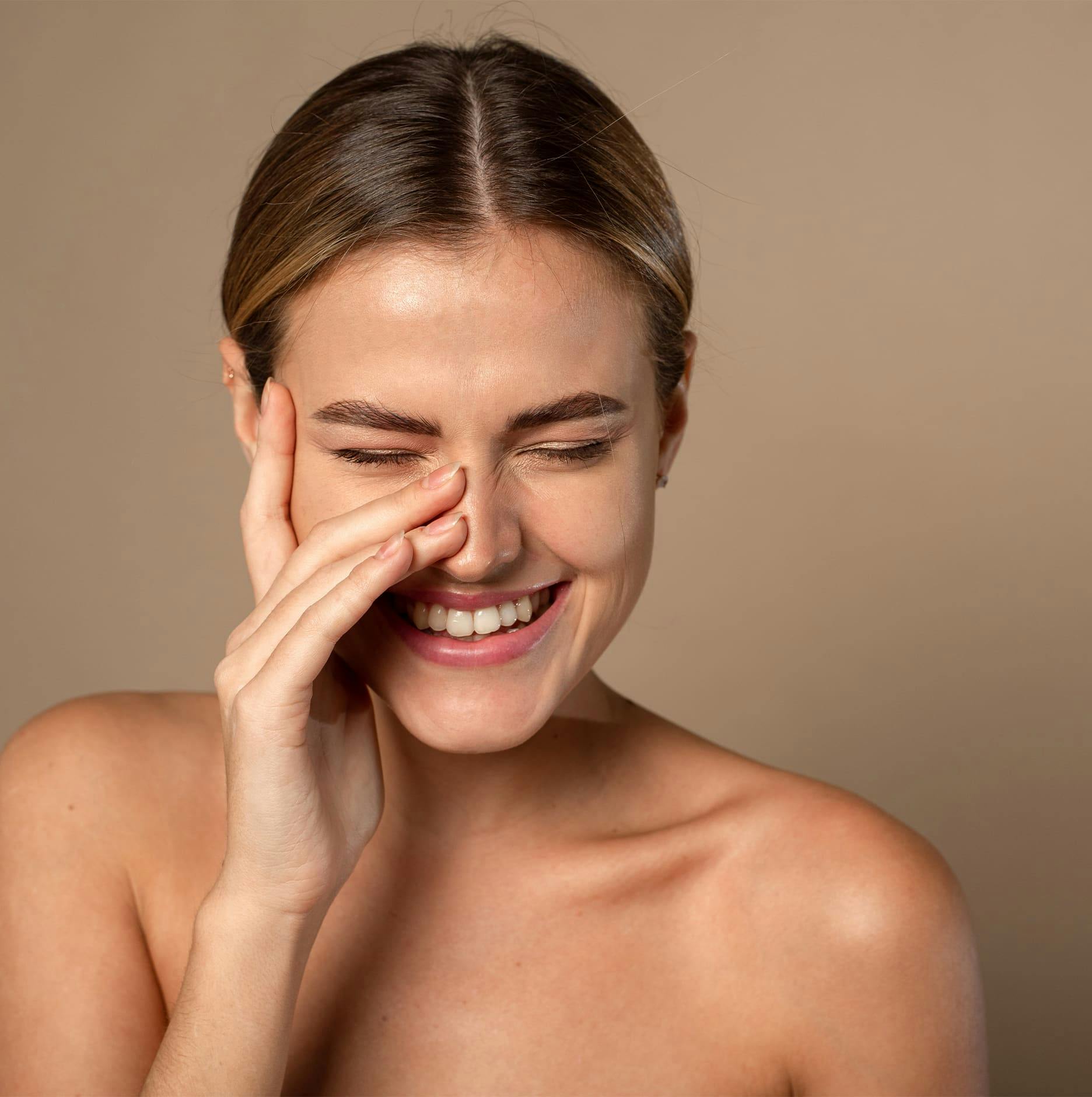
Is Synkinesis Treatment Right for Me?
Synkinesis treatment may be the right option for you if you're experiencing involuntary facial muscle movements, discomfort, or asymmetry due to synkinesis. Ideal candidates for selective neurectomy in Pasadena & Glendale with Dr. Panossian often struggle with the emotional toll of synkinesis, including impacts on self-confidence and social interactions. Symptoms may range from mild to severe, encompassing facial asymmetry, involuntary muscle contractions, and discomfort. However, the best way to determine if synkinesis treatment suits your needs is through a consultation with Dr. Panossian in Pasadena. During this appointment, Dr. Panossian will assess your anatomy and medical history, discuss your concerns and treatment options tailored to your goals, and provide personalized recommendations to address your synkinesis symptoms effectively.
What to Expect The Synkinesis Treatment Procedure
The Synkinesis treatment procedure typically involves several key steps to address the involuntary muscle movements associated with synkinesis. Before the procedure, patients undergo a thorough evaluation to assess the extent of their condition and determine the most appropriate treatment approach. Depending on the specific technique used, such as selective neurolysis or neurectomy, the procedure may be performed under local or general anesthesia. During the procedure, Dr. Panossian precisely identifies and targets the affected nerves or muscles responsible for synkinetic movements. Using advanced surgical techniques and tools, including nerve monitors, Dr. Panossian carefully locates and verifies tiny nerve branches before their selective treatment or removal. This meticulous approach allows for the precise interruption of aberrant neural pathways to minimize unintended muscle contractions while preserving essential nerve function for voluntary facial expressions. The duration of the procedure varies depending on the complexity of the case and the specific techniques employed but typically ranges from a few hours to a full day.

Synkinesis Treatment Recovery
Following synkinesis treatment, you may experience some downtime during recovery. The specific recovery process can vary depending on the extent of the treatment and individual healing factors. Mild discomfort, swelling, or bruising in the treated area can be common symptoms and typically resolve within a few days to weeks.
During the initial recovery period, it is essential to follow postoperative instructions provided by Dr. Panossian to promote healing and minimize the risk of complications. We advise patients to avoid strenuous activities and heavy lifting for a certain period to allow their bodies to heal properly.
Regular follow-up appointments with Dr. Panossian may also be scheduled to monitor progress, address concerns, and ensure optimal healing and results. Over time, patients can expect to see improvements in facial symmetry, control, and comfort as the effects of the treatment become more apparent.
Why Choose Dr. Panossian?
When considering synkinesis treatment, choosing an experienced and compassionate specialist like Dr. Panossian can make all the difference. Dr. Panossian's expertise in reconstructive surgery, highlighted by his prestigious fellowship with Dr. Ron Zuker in facial paralysis reconstruction, distinguishes him as a leading authority in the field. With specialized training in craniofacial surgery from esteemed institutions like Harvard Medical School and a wealth of experience in treating complex facial conditions, Dr. Panossian offers unparalleled skill and precision in selective neurolysis in Pasadena & Glendale, CA. With a commitment to personalized care, Dr. Panossian offers transformative solutions to alleviate the emotional burdens of living with synkinesis. Take the first step towards restoring natural facial movement and enhancing your quality of life by scheduling a consultation with Dr. Panossian today.


